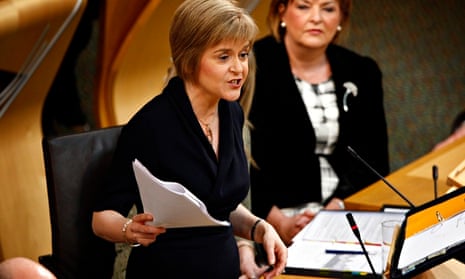As a Scot living in England, I don’t know whether to be thrilled or depressed about the Smith Commission’s announcement that Scotland will get more power over taxation. It’s brilliant to see my home country heading slowly but inexorably towards social democracy. It’s wretched to observe that, for my adopted country, this just offers one more opportunity to pander to the empty rhetoric of reactionary populism, of which there’s already far too much down south.
Reactionary populism. It’s a term you hear surprisingly little, considering that it’s the most influential force in contemporary English politics. Perhaps that’s because it’s an oxymoron. It makes absolutely no sense. A reactionary wants a return to class certainties. A populist claims to defend the people against elites. It’s by pretending that he can do both that Nigel Farage puts the wind up Labour and the Conservatives.
Naturally, of course, the influence of this destructive chimera is entirely negative. It could hardly be otherwise. Scotland, in the months to come, will no doubt be having a fruitful national debate about the fairness of higher education being paid for through higher-rate income tax, because generally graduates earn more while benefitting the whole country as well. England, in the months to come, will be getting wound up about “English votes for English matters”, seemingly oblivious to the fact that it’s the quality of the legislation being voted for that’s important, far above all else.
The reason why Cameron is so big on this English votes thing, of course, is that it’s a golden opportunity for him to strike a reactionary populist pose as a champion of the English. But it is a pose, nothing more. Scotland has been given a high degree of autonomy over income tax. But the majority of taxes raised in Scotland – VAT for one – will still be going into the general Westminster pot.
Until Scotland has complete fiscal autonomy, there will be no such thing as a piece of Westminster legislation that is of no concern to the people of Scotland, because no piece of Westminster legislation isn’t drawing from a kitty Scotland contributes to. Cameron did not want to be the Conservative leader who presided over the breakup of the union. If he goes ahead with his “English votes for English matters” wheeze, history will still, quite rightly, trace the breakup of the union back to him.
The opportunity for Cameron to act the reactionary populist, however, was what Labour feared when they warned that the recommendations of the Smith Commission were a “Tory trap”. Labour is considerably less well placed to act the reactionary populist than the Tories. When it tries to, it ends up respecting white vans. But though this may be a problem in the short term, it’s a good thing overall. Reactionary populism is an unpleasant road to nowhere.
Right now, though, the Conservatives don’t really mind how much they annoy Scotland by purporting to defend England and St George. They annoyed Scotland to the point of their virtual oblivion long ago. But Labour feels the pain of its fall from grace in Scotland acutely. Conservative ideology is unionist, even though the union is bad for it politically. But Labour has a political need to be unionist. The result of this is that the Conservatives are in a position to exploit Scottish devolution opportunistically, for southern advantage, while Labour is most certainly not.
Unfortunately, given those circumstances, Scottish devolution, and especially the referendum, has further exposed in Scotland how reactionary the Labour party has become. Labour didn’t have a narrative of its own that made an appeal to Scots to stay in the union. It just stood behind the Conservatives, waving the union jack and telling Scotland that it couldn’t manage without its powerful neighbour. It did that precisely because it couldn’t afford to upset the reactionary populists of England, by suggesting that their country needed the Scots. Reactionary populists have only one use for people who they consider not to be of like mind – and that’s blaming them for everything in their lives that they are unhappy with.
The biggest irony of all is that, if you go by what it says on the tin, the Scottish Nationalist party should be the biggest reactionary populists of all. One of the less charming aspects of Scotland in the recent past has been its habit of blaming England for its problems. But the SNP is now in the process of persuading Scotland that it can address its own problems and seek its own solutions. That’s the important thing, not independence per se. There’s a sense that the Scottish government is seeking responsibility rather than power, making it far from populist and far from reactionary.
Labour’s challenge is to persuade England that it needs to do the same. Its promised manifesto commitment to offer the regions of England similar opportunities for devolved power as Scotland is a far more sensible and practical move than Cameron’s desire to carve up Westminster. But it is doesn’t chime with the reactionary populist times.
Farage is persuading England that it’s not That London that is to blame for its troubles, but That Brussels. It feels almost pointless to note that if Farage were right about the EU then there would be no power to devolve to Scotland, and no English matters to ringfence for English votes.
But one does hope that Labour will try to get across to the electorate that blaming Europe is a cop-out, because Britain has the power to change itself for the better, just as Scotland has. Five years ago, all great hope for governmental reform lay with the Lib Dems. Now, the only social-democratic hope is that Scotland, instead of leaving the union, can lead the UK by example. It’s one final irony in a political tale that’s littered with them.

